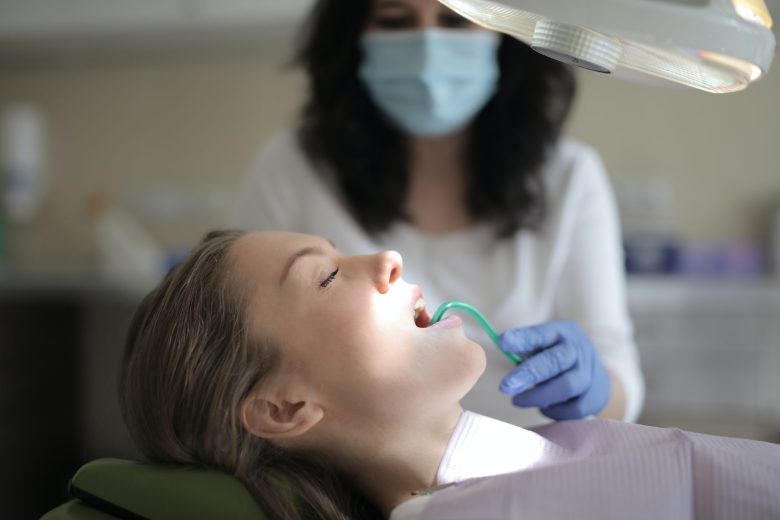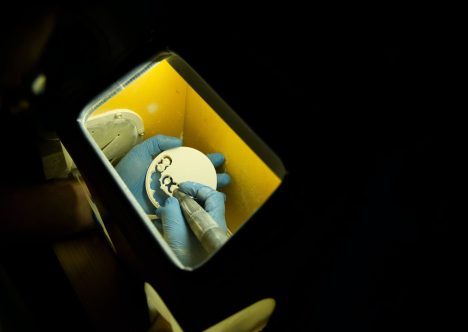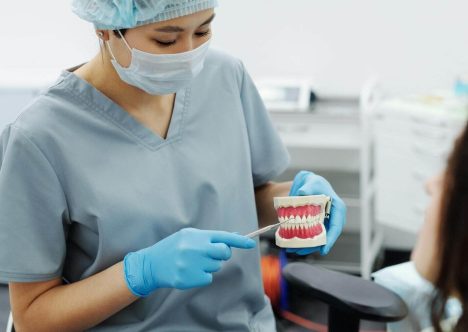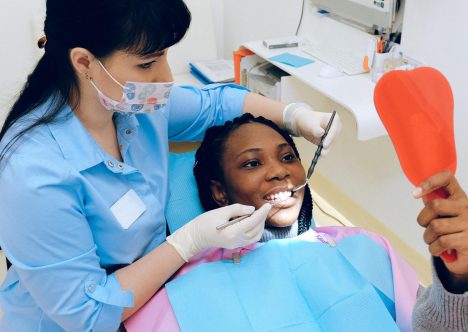Teeth are among the most attractive features of a person’s face, and losing even a single tooth causes a great deal of worry and anxiety. There could be many reasons for tooth loss. It may happen due to accidents, decayed teeth, or other oral health issues. Regardless of the underlying reason for tooth loss, it’s a condition that requires fixing to restore the proper functioning of the mouth. One of the most popular and cutting-edge methods to achieve this is through a procedure known as All-on-4 implants. This procedure can replace a full set of teeth that look as good as, if not better than, your natural teeth.
The All-on-4 technique refers to all teeth being supported on four dental implants and prosthodontics (crowns, bridges, dentures) for the total restoration of widespread tooth loss. All-on-4 implants are considered a breakthrough method of replacing several lost teeth and reconstructing a patient’s mouth to restore full function. This article explains the treatment process of All-on-4 dental implants and what you can expect from the procedure.
How Do All-On-4 Dental Implants Work?
All-on-4 dental implants are a solid anchor to which replacement teeth can be attached. The procedure allows us to replace a full arch of missing teeth with just four dental implants. A fixed bridge or denture is then linked to the patient’s natural teeth to support the implants.
The primary function of the All-on-4 concept is to support fixed dentures and remove the need for implants for each missing tooth. Since the implants are comprised of titanium, they are extremely durable and merge with the jawbone easily. Since the posterior implants in the All-on-4 ® dental implant process are slanted at a 45-degree angle towards the back of the mouth and put in the anterior maxilla, an area of the jaw with more bone density, this restorative dentistry doesn’t require as much bone density to hold the implant.
The All-On-4 Dental Implant Procedure
The All-on-4 treatment concept is a cost-effective alternative that provides patients with a fixed full-arch prosthesis on the same day of surgery. While dental implant experts may make it seem like a simple procedure, dental implant surgery is a complex procedure that takes about two hours and 30 minutes per arch on average. Your dental team at Precision Oral Surgery will also provide instructions on oral hygiene routines to prepare you for the procedure and aftercare instructions on how to care for them.
The procedure can be broken down into the following four steps:
- Initial consultation – This is a thorough evaluation to determine what your face structure requires and any additional risk factors that may affect the placement of the implants. If you have any oral health issues, including gum disease, you may need to treat them first before proceeding with a more invasive treatment like All-on-4. As a result, we will consider your oral, dental, and physical health.
- Scans of the jawbone: These are 3D images that show the accurate bridge placement of the replacement teeth and the location of the bone sinuses and nerves for the implants. It may also include x-rays, depending on your previous dental care.
- Creating a computer simulation of the implants – This stage involves developing a computer simulation of the implants, which will be digitally positioned into the jawbone at the correct location to ensure that the replacement teeth provide maximum support. We will also make necessary adjustments to the implants to meet your specific needs.
- Oral surgery – Oral surgery is the final and most important step. We will administer an anesthetic during surgery and then place the implants directly into the jawbone to anchor your new set of teeth. During the procedure, the posterior implants are slanted 45-degrees towards the back of the mouth and inserted into the anterior maxilla, an area of the jaw with higher bone density.
The first few days after surgery will determine the long-term success of your treatment.
A soft food diet is recommended for the first three months after surgery to avoid additional pressure or discomfort at the implant site. Once you complete the healing process, your permanent teeth will be placed at a follow-up visit approximately six months after surgery.
How Are All-On-4 Dental Implants Different From Traditional Implants?
Traditionally, each dental implant has a single titanium screw inserted into the gums. We will then attach a single artificial tooth to the screw. With an All-on-4 implant procedure, you don’t have to replace each missing tooth with individual implants. Instead, the main anchors will be four titanium posts surgically implanted into the jaw bone by a dental professional. We can then connect a permanent denture to those four implants to provide a seamless appearance and functional teeth.
Traditional dental implants require six to eight implants or more in each arch. In contrast, the All-on-4 dental implant approach uses only four implants per arch. The implants in the All-on-4 surgery are also angled, allowing for increased contact by leveraging the bone’s inherent support. Furthermore, unlike typical implant procedures, the All-on-4 method doesn’t require bone grafting for many individuals. As a result, this modern implant procedure is the best option for replacing a complete set of teeth on the upper or lower arch with a fraction of the implants required compared to traditional implant dentistry.
Candidacy for All-On-4 Implants
All-on-4 dental implants are ideal for individuals who have been on dentures for a while or those who are being fitted for the first time. Unlike conventional dentures, All-on-4 implant-supported dentures don’t slip or shift out of place. As such, patients can bite, chew, speak, and smile with greater ease and confidence after treatment.
In general, factors that contribute to your candidacy include:
- Missing teeth on one or both arches – While dental implants can be used to secure both crowns and bridges, All-on-4 is a method for securing full-arch dentures exclusively.
- Good health – Implant placement is a medical procedure. As such, some risk is involved if the person is not healthy.
- Quit smoking – Smoking is prohibited during recovery and before surgery. Dental implant patients are strongly advised against smoking even after recovery. Smoking increases your chances of developing oral health problems, including gum disease and implant failure.
- Adequate jawbone density – While All-on-4 implants require less bone density than standard implants, they still require a specific density level to support them.
If All-on-4 implants are right for you, your dental professional will discuss treatment options in detail so that you understand your tooth replacement options, including the cost.
Cost of All-On-4 Implants
The cost of All-on-4 implant surgery will vary depending on the type of teeth replacement you receive, among other factors. However, it’s one of the most economical ways to replace most or all of your teeth with implants. Because it only utilizes four implants to sustain full-arch treatments, it is relatively inexpensive.
Individuals can choose between a basic acrylic implant or a long-lasting porcelain implant. The following are the average prices for each:
- Acrylic or composite – $20,000 to $30,000
- Porcelain – $25,000 to $35,000
Most dental insurance plans will cover at least a portion of the cost of dental implant treatment. Many individuals finance through CareCredit ® and make affordable monthly payments for out-of-pocket expenses. Individuals can also take advantage of flexible financing options to keep treatment costs under control.
Benefits of All-On-4 Implants
Implant dentists strive to restore your teeth to their optimal condition whenever possible. However, there are situations when traditional repairs aren’t always possible. As such, when it’s time to replace your teeth, All-on-4 implants offer several key benefits, including:
- Immediate function – All-on-4 implants can permanently restore an entire arch of teeth in one sitting. This reduces the amount of time spent at our office and the number of surgical procedures required to repair an entire set of teeth.
- Easy to clean – Although All-on-4 implants are not prone to tooth decay in the same way as natural bone structures, it’s still important to take proper care of them because they can develop plaque. Fortunately, the maintenance is straightforward and similar to how you would maintain your natural teeth.
- Less need for a bone graft – Instead of the conventional removable dentures, individuals get a permanent solution without compromising the jaw bone or bypassing the need for bone grafting and sinus lifts.
- Less complex dental surgery – Traditional implants generally require 20 implants on the upper and lower arches. As their name suggests, All-on-4 implants only require four separate implants, so even individuals with significant tooth or bone loss are often good candidates for the All-on-4 procedure.
- Long-lasting results – Even if you replace your teeth with a traditional denture, your dental function will not be the same. All-on-4 dentures last much longer than traditional dentures and don’t require regular fit adjustments and repairs. In addition, dental professionals can make the most of existing bone structures and promote bone regeneration through this technique.
- Improve oral health – While missing teeth can lead to serious and painful dental conditions, implants replace the underlying tooth roots, helping you maintain your jawbone and gum health and a youthful facial structure.
All-on-4 implants are also a cost-effective way to replace an entire arch of teeth, so they are often the best choice for individuals on a budget. Since they require less surgery than replacing several individual teeth, they may be a good choice for people who are anxious about dental procedures.
Please contact Precision Oral Surgery if you are interested in dental implants, tooth extraction, or any other form of dental care. We are located in Greeley and Thornton, Colorado.






